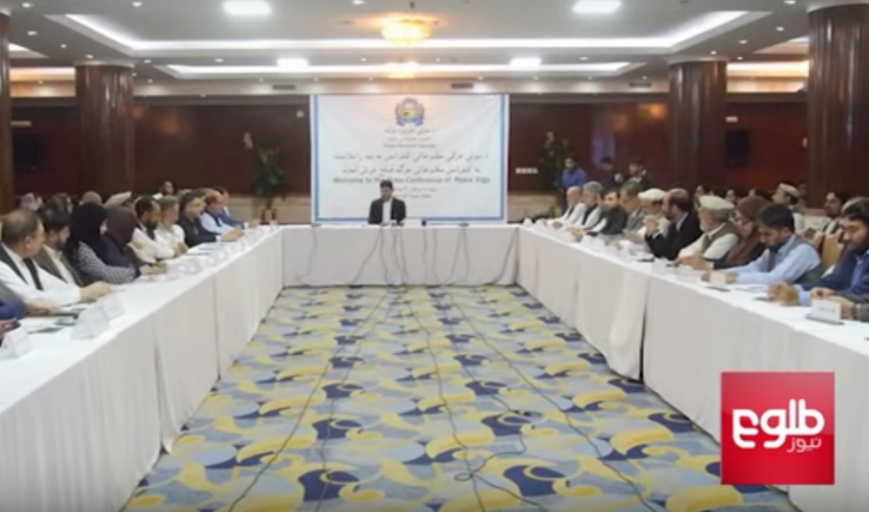 ‘Peace Jirga’ Reject Pakistan’s Stance on Kabul-Delhi Ties
‘Peace Jirga’ Reject Pakistan’s Stance on Kabul-Delhi Ties

Members of the Peace Jirga on Thursday rejected Pakistan’s position on the bilateral relations between Afghanistan and India.
Peace Jirga accused Islamabad of using the peace process as a tool to put pressure on Kabul to explain its ties with New Delhi and to entrench Pakistan’s demand that the Durand Line be established as the border with Afghanistan.
Pakistan cooperates with Kabul for peace, but for this Pakistan insists that Kabul outlines the nature of its ties with India, said former minister of interior Mohammad Omar Dawoudzai. He adding that Pakistan’s intention was also to have the Durand Line recognized as international border between the two countires.
Dawoudzai who also serves as the executive member of the Council for the Protection and Stability in Afghanistan and Peace Jirga, reiterated that searching for peace in Afghanistan through Pakistan was a big mistake.
At a gathering on Thursday, members of the Peace Jirga stressed the need for an Afghan-led and Afghan-owned peace process, pledging their full support to nurturing the peace process with the Taliban.
“Taking into consideration the current situation, I am not optimistic about Pakistan’s support of the process, but I am optimistic that we can negotiate with the Taliban directly as two Afghan nationals should,” Dawoudzai said.
Participants at the gathering insisted that the Taliban’s ongoing war in Afghanistan was unnecessary and unlawful.
“Pakistan says that we must tone down our relations with India according to will of Islamabad. Secondly, Pakistan wants us to recognize the Durand Line as the border between or two countries,” he added.
“In my view the government has the will to strive for peace with the Taliban. The international community also wants peace in Afghanistan,” head of Jabha-e-Naween Milli party Anwarul Haq Ahadi said.
While the HPC casts doubts over Pakistan’s intensions, still it believes that Pakistan has an influence on the peace process in Afghanistan.
“Pakistan has influence. Taliban’s hideouts exist there and Taliban take decisions in Pakistan, these things have given Pakistan an opportunity to play role in the peace process in Afghanistan,” Salim said.
Meanwhile, the US Special Envoy for Afghanistan and Pakistan Richard Olson has expressed fresh hope over the resumption of peace talks and said that India and Iran will also join the Afghan peace effort.
Olson has noted that both India and Iran had stakes in Afghanistan’s future and said that’s why they would be included in the quest for peace at a later stage.
In tweets sent out after he spoke at a Washington think tank on Tuesday, Ambassador Richard Olson said: “Pakistan does remain committed to the process of reconciliation and talks in Afghanistan.”
In addition the Afghan Chief Executive Officer, Abdullah Abdullah, has said that Russia and Iran were ready to help Afghanistan in restoring peace and stability.
“Both the Islamic Republic of Iran and Russian Federation believe that peace and stability in Afghanistan is in the interest of the whole region, all are ready and willing to cooperate with us in this respect,” Abdullah said.
Ambassador Olson said the US decision to eliminate Taliban leader Mullah Mansour and give combat powers to American troops in Afghanistan should not be seen as indication of a lack of interest in the peace process.
“The Taliban’s repeated refusal to join talks with the Afghan government contributed to the US decision to take action against Mullah Mansur on May 21,” he said.
The US diplomat said that despite Mansour’s killing, the US will continue to encourage an Afghan-led and Afghan owned peace process in which the Afghan government and the Taliban are able to give an end to the ongoing conflict.
“We will also continue to encourage an Afghan-led, Afghan-owned peace process in which the Afghan government and the Afghan Taliban can bring this conflict to an end.”
“Mullah Mansur was an obstacle to peace an posed a continued threat to US persons through his support for operations against US forces. He was perpetuating a war without end.” Olson said.
“We welcome any regional country that cooperates with us for peace. The issue of attaining peace in Afghanistan is not limited to Afghanistan itself, but it is in the interests of the regional as a whole,” deputy presidential spokesman Dawa Khan Menapal said.
On June 9, U.S President Barack Obama gave the US military the authority to assist the Afghan military in combat missions against the Taliban.
